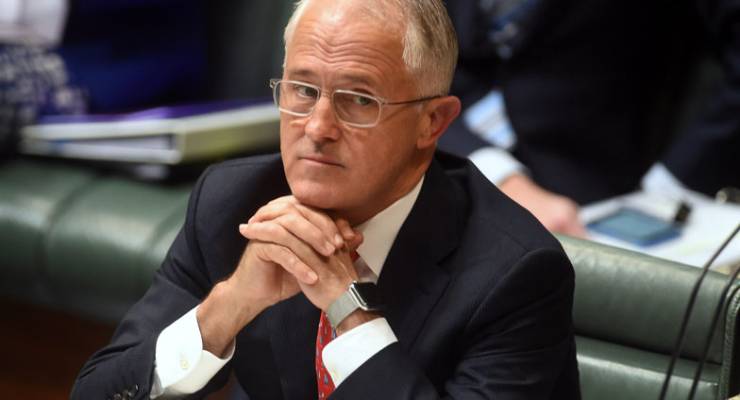
Is this a budget to head to an election on?
In ordinary circumstances, yes — it hands out wins to strategically important constituencies — tax cuts, albeit small, for middle- and high-income earners, and a lower tax rate for medium-sized businesses business and, eventually, for the big business lobby too. All key Liberal Party constituencies, all winners from the budget, and the first step toward election victory is to make sure you’ve locked in your party base. But it also addresses the government’s weak point, concerns about tax fairness, by tightening up superannuation tax concessions — a welcome and laudable policy shift by the Coalition — and multinational tax avoidance, while going partway to shutting down the opposition’s campaigning on health and schools funding.
But beyond that, it’s a mass of contradictions. This is a budget in which the Treasurer says, with all seriousness, “this is not a time to be splashing money around or increasing the tax burden”. But he has increased already substantial deficits by $10 billion over forward estimates and pushed back the return to surplus, again, by a year, meaning this government will be borrowing $100 million per day. Indeed, Morrison admitted as much at his lockup press conference. Spending was still too high, he said, and the government needed to continue working to reduce it, “budget after budget”.
But too many more budgets like this one, and we’ll never return to surplus.
And it’s a budget in which the government makes much of its commitment to curtailing multinational tax avoidance, saving $3 billion over four years in lost revenue, but which will hand out $2.65 billion over the same period to many companies through its long-term reduction in the company tax rate to 25%. How voters, who think big companies don’t pay enough tax, will react to that remains to be seen.
And it’s a budget that backs up the Prime Minister’s “Cities Plan” for urban infrastructure with virtually no new infrastructure money beyond a hundred-odd million for an airport at Badgerys Creek in Sydney.
Moreover, the political decision to bring the budget forward a week to suit the Prime Minister’s election timetable has blown up in its face, with the Reserve Bank unexpectedly striking this afternoon with an interest rate cut, signaling its concerns about what’s ahead for the economy while the government is trying to sell a story of successful transition. There’s a reason why budgets are in the second week of May rather than the first, when the Reserve Bank meets; one wonders if the geniuses in the PMO thought about that when they hit upon their brilliant double dissolution plan.
These contradictions end up obscuring whatever the “economic plan” is that Morrison claims this to be, because he insists it’s “not just another budget”. Is the plan to return to surplus over the medium term? Well, it says it is, but the return to surplus is endlessly pushed back. Is the plan to reform the tax system? Again, it says it is, but there’s no large-scale tax reform — some welcome curbs on super tax, some long-overdue tightening of multinational tax loopholes, but otherwise it’s fiddling with tax margins. Is the plan to build more infrastructure? There’s no money for that; the big spends are in tax cuts, not nation-building. That’s where those additional, borrowed dollars are going — to offset tax cuts. Is the plan about “jobs and growth”? If so, what does the Reserve Bank’s decision to cut rates to yet lower historic lows say about its confidence in the government to achieve those goals?
The lack of an apparent plan isn’t merely poor drafting of the Treasurer’s speech, or a triumph of short-termism and rushed budget preparation; it’s an example of the central problem of the Turnbull government, an incoherence about what it stands for, how it differs from (and, it would have us believe, is superior to) the Abbott government.
Labor — oddly, given the criticisms of the Gillard government around what it stood for — no longer has such a problem. It has done the hard policy work, issued difficult policies that courted attack from the government, led with its chin in key areas like tax and climate policy. But between a tax debate that went completely off the rails, Malcolm Turnbull’s unwillingness to upset his far-right opponents within his own party and Scott Morrison’s inability to find his feet in the role as Treasurer, voters remain unclear about what a Turnbull government means — except that it doesn’t mean what they thought it would mean last September.
Much — indeed, the survival of the Turnbull government — rests on this budget. For months, the political momentum has been toward Labor. It’s not clear there’s enough here to reverse that momentum. Still, there’s a long election campaign to go yet.








What I found interesting was Barnaby’s stamp on the Budget. There was reference to in-land rail, dams, water pipelines in northern Australia. It shows that Barnaby is making sure that the Nationals have a say and aren’t taken for granted.
And I think the TV coverage focused on Barnaby when they were announced.
This budget is like looking at a compass that is spinning wildly out of control as if it was conceived in the Bermuda Triangle somewhere near the Cayman Islands. LNP are just hedging their bets.
The puzzling aspect, for me, is that the government thinks this pile of pandering & pusillanimity is something of which to be proud.
Government for the privileged by the privileged.
Nation building projects these days require highly skilled workers so generate a mismatch between the unemployed and the jobs.